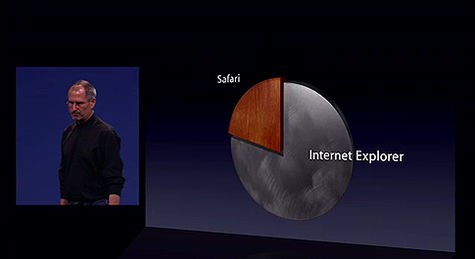John Lilly, the COO of Mozilla and a guy I’m proud to count as a friend a collaborator, has written what I think is an incredibly insightful and important statement about how the world works today. Writing in response to a recent speech given by Steve Jobs indicating that the future of the browser market could look like the pie chart shown above, John says (in part — please read his entire post if you have a chance):
There are a couple of problems, of course. The first is that this
isn’t really how the world is. The second is that, irrespective of
Firefox, this isn’t how the world should be.First, it isn’t really how the world is. The meteoric rise of Wikipedia, Creative Commons, Linux and Firefox,
among many other examples, shows that today’s connected world is no
longer constrained by the monopolies and duopolies and cartels of
yesterday’s distribution — of the publishers, studios, and OS vendors.
Hundreds of millions of users, in every language around the world are
now making new choices. That Apple doesn’t feel this, even within the
familiar reality-distortion-field confines of Moscone Center,
illustrates much of the problem.Second, it isn’t how the world should be. Even if we could somehow
put that movement back in the bottle — that a world of just Starbucks
& Peets, just Wal-mart & Target, just Ford & GM — that a
world of tight control from a few companies is good, it’s the wrong
thing to do. It destroys participation, it destroys engagement, it
destroys self-determination. And, ultimately, it wrecks the quality of
the end-user experience, too. Remember (or heard about) when you had to
get your phone from AT&T? Good times.So here’s my point, to be clear: another browser being available to
more people is good. I’m glad that Safari will be another option for
users. (Watch for the Linux port Real Soon Now.) We’ve never ever at
Mozilla said that we care about Firefox market share at the expense of
our more important goal: to keep the web open and a public resource.
The web belongs to people, not companies.This world view that Steve gave a glimpse into betrays their
thinking: it’s out-of-date, corporate-controlled, duopoly-oriented,
not-the-web thinking.
John is right. This isn’t 1957. What’s good for GM, or Apple, or Microsoft, isn’t necessarily good for all the rest of us formerly known as the audience. If you believe in starting with the needs and desires of real people as a way to create real value and meaning in the world, then things like engagement and choice and self-determination are not just "nice to haves", but are critical means to an end, where the end is an informed, savvy, and free (as in liberty, not price) society. As John says, "The web belongs to people, not companies." Markets do, too. So do brands.
Web thinking is freedom thinking. And it is the driver of modern, progressive marketing.


What if the open world is clustered around the iPhone ecology, not actually about getting PC browser share… and anyway that will more likely come off IE… won’t it?
I agree that the world has changed mostly for the better with respect to choice and end user experiences. However, in some areas, there are too many choices and making decisions takes time, (some of it wasted time). It has become overwhelming.
One other problem with too many choices is the possible reduction in opportunities for standardization which is needed to share information. With media and entertainment, customization is harmless, but when it comes to hard products like automobiles, user customization and self-determination without limits can become a safety and liability issue. Sometimes the customer doesn’t know what’s best.
Atul
http://www.thingsivenoticed.com
The thoughts here kept making me wonder where I had seen a “scientific” argument in the same vein… I just picked up Christensen’s book “Seeing What’s Next” to reread and it hit me: a BusinessWeek interview with Clayton C. http://snipurl.com/1qcaz which uses “Innovator’s Dilemma” thinking on Apple.